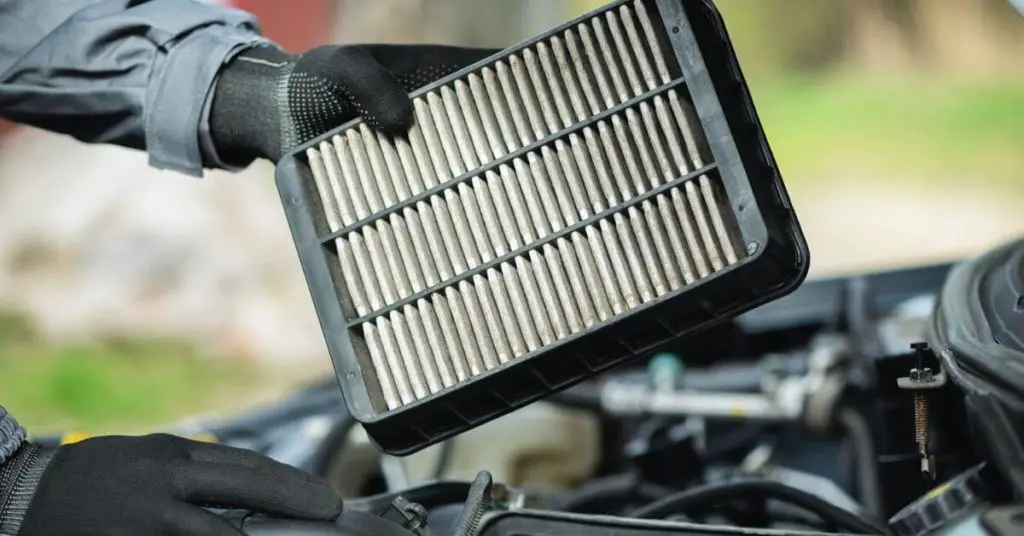If you’ve ever turned on the air conditioner in your car only to be hit with a strong, unpleasant odor reminiscent of vinegar, you’re not alone.
This issue is more common than you might think and can be caused by various factors.
In this post, we’ll explore why your car AC smells like vinegar and provide tips and tricks for removing the odor and ensuring your car air conditioner system is functioning correctly.
So if you’re tired of driving with the windows down to avoid the unpleasant odor, read on for some helpful information.

Table of Contents
Why Does My Car Smell Like Vinegar? The most common causes:
Spilled food or drinks that contain a vinegar-like smell
Spilled food or drinks that contain vinegar can cause the air conditioner system to emit a “rotten eggs” odor.
This happens when the vinegar enters the ventilation system thru the air vents and becomes trapped, causing the smell to linger.

The acidity of vinegar can also cause corrosion in the car HVAC system, potentially leading to more severe problems.
To prevent this from happening, it’s essential to clean up any spills promptly and to avoid eating or drinking anything that contains vinegar in the car.
Suppose you experience an unpleasant vinegar smell in your car’s air conditioner system.
In that case, it can often be remedied by running the car AC on the highest fan setting for several minutes with the windows down, which will help to circulate fresh air through the system and clear out the odor.
Moisture buildup in the car
Moisture buildup within a car can lead to various unpleasant consequences, including mold growth and a dingy smell inside vehicles.
This accumulation of moisture can result from several factors, including leaks in the vehicle’s roof or windows, condensation from the air conditioner, and insufficient ventilation.

To mitigate the effects of moisture buildup, it is vital to check the vehicle for leaks regularly and to address them promptly, to ensure the proper functioning of the car AC, and to increase ventilation by cracking windows or using a dehumidifier.
Additionally, it may be beneficial to periodically inspect the vehicle’s interior for signs of mold or mildew and to clean any affected areas with a fungicide.
These steps can reduce the likelihood of moisture buildup within the car and its associated consequences, like a car smells (LOL).
You might also like to know if car A/C use gas?
Bacterial Growth
Bacterial growth is one of the most common causes of why car ac smells like vinegar.
Bacteria and mold thrive in warm and moist environments, and the interior of a car AC system and cabin air filter provides the perfect breeding ground.
Over time, the bacteria can emit a musty or vinegary odor, which can be unpleasant and potentially harmful.
Use of household cleaning products that contain vinegar
The use of household cleaning products that contain vinegar can have both positive and negative impacts on the maintenance and upkeep of a car.
On the one hand, vinegar’s natural acidic properties can effectively break down dirt and grime, making it an effective cleaning agent for various surfaces within the vehicle.

On the other hand, excessive exposure to vinegar-based cleaning products can result in corrosion and damage to specific materials, such as rubber seals and plastic components, as well as vinegar car smells.
Leaking Refrigerant: A Problem That Can’t Be Ignored
Another reason for a vinegary smell in the car air conditioner is a leak in the refrigerant system.
The refrigerant keeps the AC system cool and cold air; a leak can reduce the system’s cooling capacity.
Additionally, the refrigerant can mix with oil in the system, creating a sludge emitting a vinegary odor, causing the growth of bacteria and mold within the air conditioning system.
Clogged AC Drain
A clogged AC system can result in diminished performance, decreased airflow, and an unpleasant musty smell.
Some of the most common causes of clogged AC drain in car AC systems include:
- Debris: Dust, dirt, and debris can accumulate in the drain line and cause blockages.
- Mold and Algae Growth: Moisture from the AC system can create the ideal environment for mold and algae to grow, leading to clogs.
- Poor Maintenance: Not regularly changing the air filters or neglecting other maintenance tasks can lead to clogs in the drain line.
- Broken Drain Pan: A damaged or broken drain pan can cause water to leak into the ducts and eventually clog the drain line.
- Blockage in the Evaporator Core: If the evaporator core in the car’s AC system becomes clogged, it can cause blockages in the drain line.
It’s important to promptly address a clogged AC drain in a car’s AC system to prevent water damage and ensure proper functioning. Regular maintenance and inspections can help prevent clogs from forming.
Eliminating the car AC smells
You can use several methods to eliminate the vinegar smell in your car. Here are some of the most effective ways:
Method 1: Ventilation
Increasing ventilation is one of the easiest ways to eliminate that vinegar smell in your car. All you need to do is open all the car vents, windows, and sunroof or turn the fan high.
This allows fresh air to flow through the car and eliminates the vinegar odor. Simple and effective!
Method 2: Baking Soda
Baking soda is a versatile household staple that can help get rid of vinegar odors in your car. Its absorbent properties make it an ideal solution for neutralizing vinegar smell and is simple and effective.
To get rid of vinegar odors in your car with baking soda, follow these steps:
Sprinkle a generous amount of baking soda on your car’s floor mats and seats.
Let the baking soda sit for several hours or overnight.

Vacuum up the baking soda, and get into all the nooks and crannies.
The baking soda will absorb the vinegar odor, leaving your car smelling fresh and clean. If you still notice a slight vinegar odor, repeat the process until it’s completely gone.
Baking soda is an affordable and non-toxic solution that can help eliminate vinegar odors in your car.
Whether you’re dealing with a minor odor or a more persistent problem, it’s worth trying baking soda!
Method 3: White Vinegar
White vinegar can be used to neutralize the vinegar smell in your car. Fill a bowl with white vinegar and place it inside the vehicle.
Leave the bowl in the car for a few hours, then remove it and air out the car by opening the windows and sunroof.
Also, you might mix equal parts of water and white vinegar in a spray bottle.
Spray the solution generously on the affected areas of your car and let it sit for a few minutes.
The acetic acid in the white vinegar will neutralize the vinegar smell and leave a fresh, clean scent. You may need to repeat the process a few times for tough odors.
Method 4: Car Air Fresheners
A straightforward solution is to use a car air freshener. Several car air fresheners are available, including sprays, vent clips, and plug-ins.
Choose one with a scent you like and can effectively mask the vinegar odor. To use, follow the instructions on the product, whether it’s spraying the solution, clipping it to your air vents, or plugging it into your car’s cigarette lighter.
Using a fabric freshener spray or an air freshener is another option to combat vinegar odors in your car.
These sprays are specifically designed to neutralize unpleasant odors and can be an effective solution for removing vinegar smells in your vehicle.

These sprays cover up the vinegar odor with a more pleasant scent.
To use a fabric freshener or air freshener, follow these steps:
Spray the fabric freshener or air freshener liberally throughout the car’s interior.
Wait a few minutes for the scent to disperse and take effect.
Remember that while fabric freshener sprays and air fresheners can help cover up the smell, they do not address the root cause of the odor.
Nevertheless, they can be a quick and effective solution for removing vinegar odors in your car.
Method 5: Use Activated Charcoal
Activated charcoal, a highly porous form of carbon, is renowned for its capacity to trap and absorb undesirable odors, gases, and pollutants.
To eliminate the vinegar smell from a car, place a bag of activated charcoal inside and let it sit for several hours or overnight.
This non-toxic, natural solution works by absorbing the vinegar odor from the air and confining it within the bag, resulting in a fresh and clean car smell.
No chemicals or sprays are necessary.
Method 6: Ozone Generator
An ozone generator is a device that produces ozone, a highly reactive form of oxygen, which can be used to eliminate odors from the car’s interior.
Ozone can neutralize unpleasant odors, including vinegar smells, by breaking down odor-causing compounds.
To use an ozone generator to get rid of vinegar odors in your car, follow these steps:
Close all the car’s air vents, windows, and doors and turn off the air conditioning.
Place the ozone generator in the car and turn it on.
Leave the car closed for several hours to allow the ozone to circulate and neutralize the odor.
It’s important to note that ozone is a highly reactive gas and can be harmful if inhaled in large quantities.
Therefore, leaving the car closed for several hours after using an ozone generator is recommended to allow the ozone to dissipate before entering the vehicle.
While an ozone generator can be an effective solution for removing vinegar odors in your car, it’s also essential to address the root cause of the scent to prevent it from returning.
Method 7: Replace Air Filter
Replacing the AC filter is essential in maintaining the health and cleanliness of your car’s air conditioning system, and it can also help eliminate vinegar odors.
Over time, the AC filter can become clogged with dirt, dust, and other contaminants, reducing efficiency and potentially leading to unpleasant odors.

To replace the AC filter in your car, you will need to follow these steps:
Locate the AC filter: The location of the AC filter may vary depending on the make and model of your car, but it is typically located somewhere in the engine compartment or near the passenger cabin.
Remove the old filter: In most cases, the old filter can be easily removed by releasing a few clips or unscrewing a few screws.
Install the new filter: Insert the new air filter into the exact location as the old clogged cabin air filter, ensuring that it is securely in place.
Replacing the AC filter every 12,000 to 15,000 miles is recommended, or as often as specified by the manufacturer’s guidelines.
Replacing the cabin air filter regularly will help ensure that your car’s air conditioning system is functioning correctly, and it can also help eliminate unpleasant odors, including vinegar smells.
Preventing the Vinegar Smell from Returning
Once you have successfully eliminated the vinegar smell in your car, it is crucial to take steps to prevent it from returning. Here are some tips for preventing the vinegar smell from returning:
Avoid eating or drinking in your car.
Clean up spills immediately.
Use a car air purifier to keep the air fresh.
Regularly clean the car’s carpets and upholstery.
Have the air conditioning system serviced annually.
Can a vinegary smell in car air conditioners cause health problems?
Yes, a vinegary car smell can cause health problems, as it may indicate the presence of mold and bacteria. Exposure to mold and bacteria can cause respiratory issues and allergic reactions.
Can a vinegary car AC smell be resolved by using air fresheners?
No, using air fresheners will not resolve the underlying problem causing the vinegary smell in the car AC unit.
It’s essential to clean the AC using a car air condition cleaner to replace the clogged air filter, but the most important is to address the root cause of the problem.
Can a vinegar smell in car AC systems signify refrigerant fluid leaks?
A vinegar smell can indicate a refrigerant leak. A refrigerant leak can reduce the cooling capacity of the whole air system and mix with oil, creating a sludge that emits a sour smell and vinegary odor.
Can a clogged AC drain cause a vinegary smell from air ducts?
Can a clogged AC drain cause a Yes, a clogged AC drain can cause a buildup of water inside the air conditioning system, leading to mold and bacteria growth and emitting a vinegary smell. smell from air ducts
Is cleaning the air conditioning system necessary to resolve a vinegary smell?
Yes, cleaning the system is one of the first steps to fixing a vinegary smell in car air conditioning systems. A professional cleaning service can remove the bacteria; dead animals stuck, mold, and debris causing the odor and inspect the system for any other issues.
Conclusion
In conclusion, if your car’s AC system emits a vinegar-like odor, it’s important to address the issue immediately.
The unpleasant smell could indicate a more serious problem within the AC system, such as a clogged drain line.
By addressing the issue promptly, you can prevent water damage, improve your car’s air quality, and extend your AC system’s life.
Don’t let the vinegar odor in your car’s AC system ruin your driving experience any longer!
Share with us in the comments below your best solution for eliminating this unpleasant smell. Your tip could help someone else and make their driving experience much fresher and more enjoyable!




